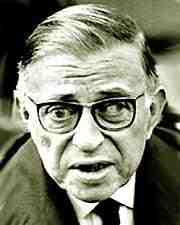 "In 1964, (...) he was awarded the Nobel Prize for Literature, but he declined it, stating that "It is not the same thing if I sign Jean-Paul Sartre or if I sign Jean-Paul Sartre, Nobel Prize winner. A writer must refuse to allow himself to be transformed into an institution, even if it takes place in the most honorable form." He was the first Nobel Laureate to voluntarily decline the Nobel Prize. Though his name was now a household word (as was "existentialism" during the tumultuous 1960s), Sartre remained a simple man with few possessions, actively committed to causes until the end of his life, such as the student revolution strikes in Paris during the summer of 1968 during which he was arrested for civil disobedience. General De Gaulle intervened and pardoned him, commenting that "you don't arrest Voltaire."
"In 1964, (...) he was awarded the Nobel Prize for Literature, but he declined it, stating that "It is not the same thing if I sign Jean-Paul Sartre or if I sign Jean-Paul Sartre, Nobel Prize winner. A writer must refuse to allow himself to be transformed into an institution, even if it takes place in the most honorable form." He was the first Nobel Laureate to voluntarily decline the Nobel Prize. Though his name was now a household word (as was "existentialism" during the tumultuous 1960s), Sartre remained a simple man with few possessions, actively committed to causes until the end of his life, such as the student revolution strikes in Paris during the summer of 1968 during which he was arrested for civil disobedience. General De Gaulle intervened and pardoned him, commenting that "you don't arrest Voltaire."A visszautasítás eleganciája
2008.04.18. 09:14 L'Étrangére
 "In 1964, (...) he was awarded the Nobel Prize for Literature, but he declined it, stating that "It is not the same thing if I sign Jean-Paul Sartre or if I sign Jean-Paul Sartre, Nobel Prize winner. A writer must refuse to allow himself to be transformed into an institution, even if it takes place in the most honorable form." He was the first Nobel Laureate to voluntarily decline the Nobel Prize. Though his name was now a household word (as was "existentialism" during the tumultuous 1960s), Sartre remained a simple man with few possessions, actively committed to causes until the end of his life, such as the student revolution strikes in Paris during the summer of 1968 during which he was arrested for civil disobedience. General De Gaulle intervened and pardoned him, commenting that "you don't arrest Voltaire."
"In 1964, (...) he was awarded the Nobel Prize for Literature, but he declined it, stating that "It is not the same thing if I sign Jean-Paul Sartre or if I sign Jean-Paul Sartre, Nobel Prize winner. A writer must refuse to allow himself to be transformed into an institution, even if it takes place in the most honorable form." He was the first Nobel Laureate to voluntarily decline the Nobel Prize. Though his name was now a household word (as was "existentialism" during the tumultuous 1960s), Sartre remained a simple man with few possessions, actively committed to causes until the end of his life, such as the student revolution strikes in Paris during the summer of 1968 during which he was arrested for civil disobedience. General De Gaulle intervened and pardoned him, commenting that "you don't arrest Voltaire."Szólj hozzá!
Ars poetica
2008.04.14. 17:47 L'Étrangére
Számos érdekes emberrel hozta össze a sors: Charlie Chaplin egykori felesége volt a barátnője, barátjának tarthatta kedvenc zeneszerzőjét, Richard Strausst. Még látta kártyázni André Citroent a híres autógyárost a St. Moritz-i Hotel Palace-ban, ami akkoriban a luxus fellegvárának számított. Citroen egyébként később az egész gyárát elvesztette egy kártyapartyn. Fordulatokban gazdag életútja során André Kostolanyt Charles de Gaulle elnök a francia becsületrend lovagjává avatta. 1988 márciusában előadóként részt vett a Budapesten megrendezett tőzsdekonferencián, ahol hivatalos keretek között első alkalommal gyűlt össze mindenki, aki tenni akart az újjászülető magyar tőzsdéért. Az 1996. áprilisi közgyűlésen a BÉT Tőzsdetanácsának örökös, tiszteletbeli elnökévé választották. Ezt követően a világ számos országában népszerűsítette a magyar tőzsdét, a tőzsdei befektetéseket. Két szenvedélye volt: a tőzsde és a komolyzene, kiváltképp az operák. Mikor sikerei okáról faggatták, mindig ezt válaszolta: „A szívem balra található, a fejem jobbra figyel, a pénzem pedig Amerikában van.”
Szólj hozzá!
Gratulálok, Hannah!
2008.04.10. 07:31 honoré
In 1926, when Arendt informed Heidegger of her other affairs, he congratulated her. "I love you as on the first day - that you know," Arendt wrote to him, but in 1929 she married Günther Stern, and moved with him to Frankfurt. Stern was a journalist and former philosophy student. Arendt did not love him and they divorced in 1937. Arendt's doctoral thesis, Der Liebesgriff bei Augustin: Versuch einer philosophischen Interpretation, appeared in 1929. In a note, referring to Heidegger, she criticized his concept of "world" as impersonal and loveless. In Arendt's subsequent study of Rahel Varnhagen, a Berlin Jew, her description of Rahel's broken love affair with Count Finckenstein has been read as an examination of Arendt's own experiences.
http://www.kirjasto.sci.fi/arendt.htm
http://www.kirjasto.sci.fi/arendt.htm
Szólj hozzá!
Althusser felfedezte
2008.04.10. 07:24 honoré
On November 16, 1980, Althusser strangled his wife, Hélène Legotien née Rytmann, to death, following a period of alleged mental instability. The exact circumstances are debated, with some claiming it was deliberate, others accidental. Althusser himself claimed not to have a clear memory of the event, saying that, while he was massaging his wife's neck, he discovered he had strangled her.
http://en.wikipedia.org/wiki/Althusser
http://en.wikipedia.org/wiki/Althusser
Szólj hozzá!
A helyes elmélet
2008.04.10. 07:21 honoré
"Hová tudna elbújni? – ez a kérdés foglalkoztatta a csoport többi tagját. Lakatos azt a megoldást javasolta, hogy Izsáknak öngyilkosságot kell elkövetnie. A rémült lány megpróbálta rávenni, hogy találjanak valami más megoldást, ám Lakatos hajthatatlan maradt. Szavazásra tette föl a kérdést. Mindenki, még Weisz is egyetértett a tervvel. Izsák Évához fordulva Lakatos elõadást tartott arról, hogy a helyes elméletet felismerése után mindig át kell fordítani a gyakorlatba."
http://www.c3.hu/scripta/scripta0/replika/29/bun.htm
http://www.c3.hu/scripta/scripta0/replika/29/bun.htm
